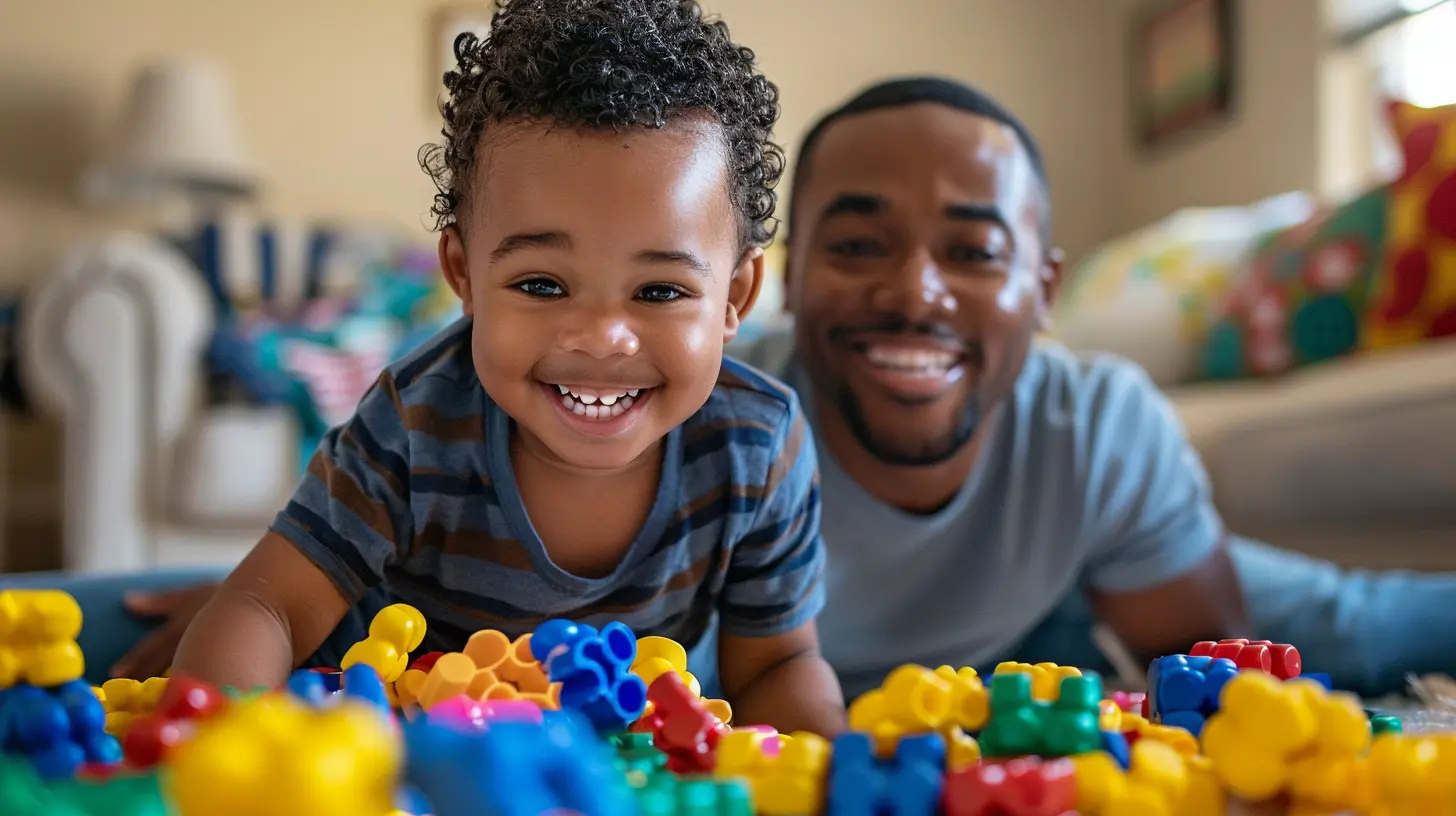The Power of Play: Stay-At-Home Dads and Building Strong Kids
5 July 2025
Parenting is an adventure—one filled with triumphs, challenges, and plenty of surprises. And in recent years, the traditional roles in parenting have shifted dramatically. More fathers are stepping into the role of the primary caregiver, and it's changing the game for kids in incredible ways. One of the most powerful tools in their parenting arsenal? Play.
Stay-at-home dads are proving that play isn't just about fun—it’s a crucial part of raising confident, emotionally secure, and intelligent kids. But why is play so essential? And how can dads use it to build strong kids mentally, emotionally, and physically? Let’s dive in.
Why Play Matters More Than Ever
In today’s fast-paced, technology-driven world, kids are constantly bombarded with structured activities, screens, and rigid schedules. Free play—the kind that involves imagination, exploration, and creativity—is often pushed to the back burner.But research confirms that play is essential for a child’s development. It’s through play that kids learn problem-solving skills, social interaction, and emotional resilience. It helps them manage stress, understand relationships, and develop independence.
For stay-at-home dads, playtime isn’t just about passing the hours—it’s a golden opportunity to nurture their children’s minds, hearts, and bodies in ways that textbooks or screens never could.
The Stay-At-Home Dad Advantage
So, what makes stay-at-home dads uniquely positioned to harness the power of play? Historically, dads have often been viewed as the “fun parent,” the one who engages in roughhousing, outdoor adventures, and goofy antics. But when a dad becomes the primary caregiver, his role in play extends far beyond wrestling matches and tickle fights.Stay-at-home dads bring:
- A Different Play Style: Studies have shown that dads tend to engage in more active, unpredictable, and risk-taking types of play, which can be incredibly beneficial for a child's cognitive and social development.
- Encouragement of Independence: Dads often encourage problem-solving and independence through play, allowing kids to take risks within safe boundaries.
- A Fresh Perspective: Since societal norms are still shifting, stay-at-home dads often feel the need to be extra intentional in their parenting. This can lead to a well-rounded and deeply engaged approach to play.
Let’s break down how different types of play contribute to raising strong, resilient, and capable kids.
Physical Play: Building Strength and Confidence
Ever noticed how dads love to flip their kids upside down, swing them around, or chase them in an exhilarating game of tag? There’s a reason for that. Physical play is more than just fun—it’s a foundation for physical health, coordination, and self-confidence.Benefits of Physical Play
- Develops motor skills: Running, climbing, and jumping improve coordination and strength.- Boosts confidence: Kids learn what they’re capable of as they push their physical limits in a safe environment.
- Teaches risk management: Climbing that tree or attempting to balance on a log teaches kids to gauge risks.
How Dads Can Make It Happen
- Have daily outdoor adventures, whether it’s biking, hiking, or just playing soccer in the backyard.- Engage in rough-and-tumble play, like wrestling or playful chasing, to help kids build resilience and emotional regulation.
- Encourage new challenges—maybe it’s learning to ride a bike or attempting a new gymnastics move.

Imaginative Play: Developing Creativity and Emotional Strength
Ever had a tea party with a stuffed bear or built an entire kingdom out of couch cushions? That’s imaginative play in action. It’s not just about having fun—it’s about encouraging creativity, emotional intelligence, and problem-solving.Benefits of Imaginative Play
- Stimulates creativity: Kids learn to think outside the box and develop problem-solving skills.- Enhances emotional intelligence: Pretend play allows kids to express feelings, work through fears, and understand different roles in society.
- Encourages communication skills: Whether they’re playing house or pretending to be superheroes, kids foster better verbal and social skills.
How Dads Can Make It Happen
- Dive into pretend play—whether it means wearing a cape or being the villain in an epic battle.- Encourage open-ended toys like building blocks, costumes, or dolls that let kids lead the storytelling.
- Create "yes spaces" where kids feel free to make a mess, build forts, or invent new games.
Board Games and Structured Play: Teaching Strategy and Patience
Structured play, like board games or puzzles, brings a different set of benefits. It teaches kids how to follow rules, strategize, and develop patience—all important skills for school and life.Benefits of Structured Play
- Teaches patience and turn-taking: Kids learn how to wait their turn and enjoy the process rather than just the outcome.- Improves focus and memory: Games that involve strategy help kids develop concentration and critical thinking.
- Encourages social skills: Learning how to lose gracefully and win humbly is an important part of emotional maturity.
How Dads Can Make It Happen
- Host a weekly board game night and let the kids pick the game.- Use games as a way to teach lessons—chess for strategy, Uno for quick thinking, and Monopoly for money management.
- Keep it fun! Losing should never feel defeating; it’s all part of learning.
The Emotional Bond Through Play
One of the most beautiful aspects of play is the connection it fosters between parent and child. Through laughter, shared experiences, and inside jokes, play strengthens the emotional bond like nothing else.When dads take the time to engage in play, they send a powerful message: "You matter. I enjoy spending time with you. I see you."
This deep emotional connection creates a foundation of trust and security that will last a lifetime.
Overcoming Screen Time Temptations
With digital devices constantly competing for attention, it’s easy for kids to default to passive entertainment. While technology has its place, nothing can replace the benefits of real, hands-on play.Tips to Limit Screen Time
- Set aside dedicated “screen-free play” hours each day.- Engage kids in active, engaging play before they even ask for a screen.
- Keep things fun—if kids see play as an exciting alternative, they won’t miss the tablet.
The Takeaway: Play Is Powerful
When stay-at-home dads embrace the power of play, they’re doing so much more than filling time. They’re teaching resilience, boosting creativity, encouraging problem-solving, and building deep emotional connections.Strong kids aren’t just built through academics or strict discipline. They’re built through laughter, exploration, and play.
So, dads, keep wrestling, keep playing house, keep inventing silly games—because in doing so, you’re raising kids who will grow up to be confident, kind, and capable human beings.
After all, childhood doesn’t last forever, but the impact of play will last a lifetime.
all images in this post were generated using AI tools
Category:
Stay At Home DadsAuthor:

Liam Huffman
Discussion
rate this article
1 comments
Uzi McGuffin
Engaging in play fosters emotional bonds, enhances development, and empowers stay-at-home dads in parenting roles.
July 16, 2025 at 3:03 PM

Liam Huffman
Thank you for highlighting the vital role of play in strengthening bonds and enhancing development. It's essential for stay-at-home dads to embrace this empowering aspect of parenting.


